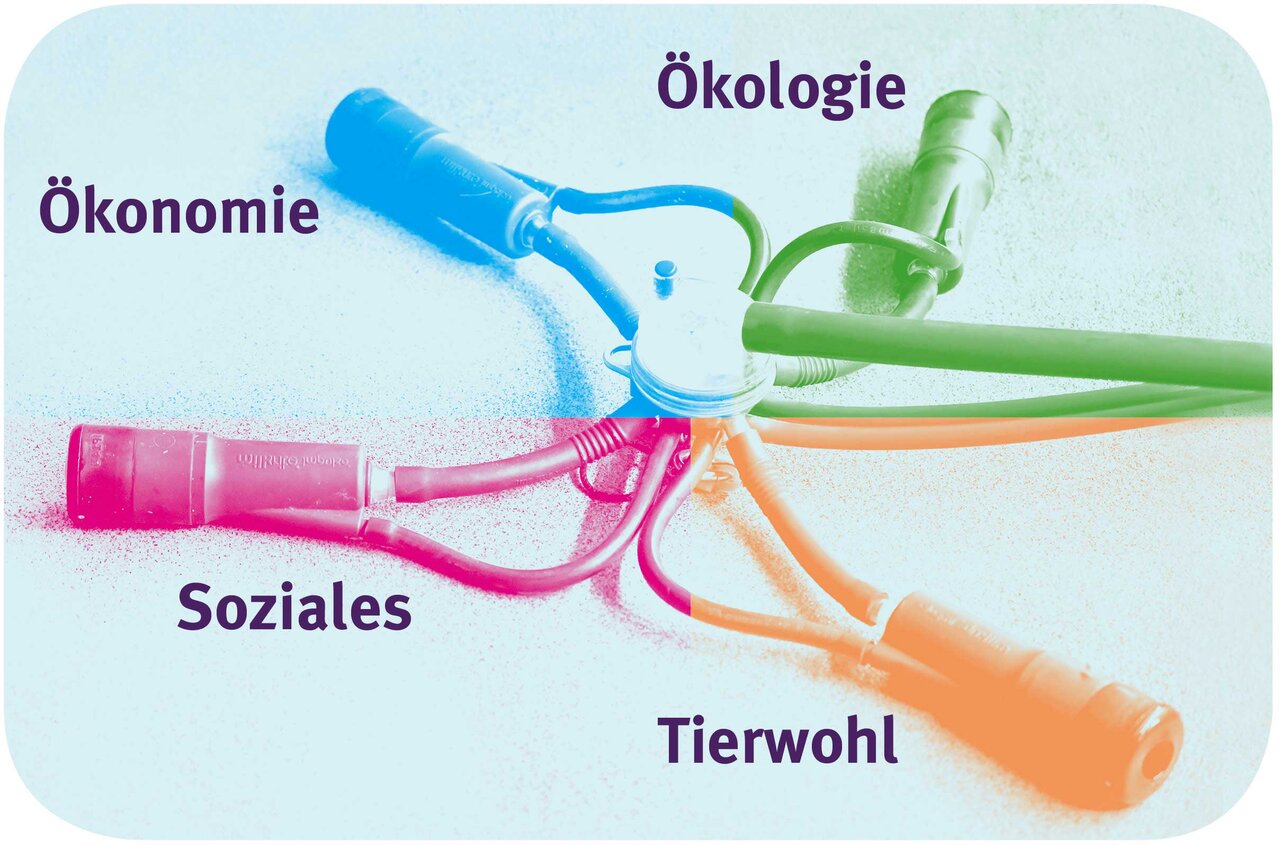Project
QM-Dairy Sustainability Tool

The QM-Dairy Sustainability Tool is used to collect data on the sustainability of milk production throughout Germany. More than 25 dairies are participating.
Background and Objective
Sustainable and responsible management is gaining increasingly importance in the production, processing and marketing of food, at national and international level as well. This also applies to the German dairy industry and its international competitiveness. Against this background, the Thünen Institute of Farm Economics together with QM-Milch e.V. and the project office Land und Markt developed the "Sustainability Dairy Tool". It was used and tested in practice for the first time from 2017 to 2020. Based on the experience and knowledge gained in the pilot phase the tool was further developed and is now called “QM-Dairy Sustainability Tool”.
The aim of the joint project with QM Milch e.V. is to further implement the QM-Dairy Sustainability Tool in practice. It is intended to support dairies and milk producer associations and their dairy farms in the sustainable development of milk production and to initiate a dialogue on the relevant topics and processes towards more sustainable milk production. It is intended to provide facts in order to be able to inform market partners and society "where the dairy farmers stand in terms of sustainability" and how the sustainability status is developing.
Approach
1) Application of the QM-Dairy Sustainability Tool in more than 25 dairies
2) Analysing the data; preparation of dairy reports and benchmarking reports for milk producers
3) Preparation of a nationwide report on the sustainability of dairy farms in Germany
4) In-depth statistical analyses on specific issues
5) Ensuring the scientific foundation
6) Securing the multi-stakeholder process
7) Ensuring international connectivity
Data and Methods
The data is collected by means of a written (online-based) questionnaire. The evaluation of the data for the dairy processors is mainly descriptive. Multivariate statistical methods are also used for the in-depth scientific analyses. We also apply qualitative methods (group discussions, expert discussions) as part of the evaluation and stakeholder analysis.
Links and Downloads
Thünen-Contact

Involved Thünen-Partners
Involved external Thünen-Partners
-
QM-Milch e.V.
(Berlin, Deutschland) -
Landeskontrollverband Nordrhein-Westfalen e.V. (LKV NRW)
(Krefeld, Deutschland)
Funding Body
-
participating dairies
(national, privat)
Duration
7.2020 - 6.2026
More Information
Project status:
ongoing
Publications to the project
- 0
Raschel A, Becker V (2025) 15 Ergebnisberichte zu Erzeugerbefragungen der im Projekt teilnehmenden Molkereien [unveröffentlicht].
- 1
Lassen B (2025) Betriebliche Auszeiten - ein unterschätzter Erfolgsfaktor? Landwirt(10):38-41
- 2
Lassen B, Fuchs B (2024) "Wir müssen die CO2-Rechner vereinheitlichen" [Interview]. DLG Mitt(10):29
- 3
Becker V, Raschel A, Rethmeyer F (2024) 11 Ergebnisberichte zu Erzeugerbefragungen der im Projekt teilnehmenden Molkereien [Nicht veröffentlicht].
- 4
Raschel A, Don A, Lassen B (2024) CO2 besser reduzieren statt kompensieren. Bauernzeit 65(32):42-43
- 5
Raschel A, Don A, Lassen B (2024) Der schwierige Weg zu klimaneutraler Milch : Welchen Beitrag kann die Kohlenstoffbindung leisten? Bauernbl Schleswig-Holstein Hamburg 78(46):38-39
- 6
Raschel A, Don A, Lassen B (2024) Der steinige Weg zu klimaneutraler Milch. DLG Mitt(1):40-43
- 7
Raschel A, Don A, Lassen B (2024) Gibt es Wege zu klimaneutraler Milch? Land & Forst 177(21):14-15
- 8
Lassen B (2024) Raus aus dem Hamsterrad. Top Agrar 53(11):R24-R26
- 9
Lindena T, Danne M, Gentz M, Lassen B, Nieberg H, Raschel A (2023) QM-Dairy Sustainability Tool. Braunschweig: Thünen Institute of Farm Economics, 2 p, Project Brief Thünen Inst 2023/20a, DOI:10.3220/PB1708586037000
- 10
Lindena T (2023) "Wir zeigen verschiedene Stellschrauben" : wie Milchviehhaltung nachhaltiger wird [Interview]. Agrarzeitg Ernährungsdienst 78(25):14
- 11
Lassen B, Lindena T (2023) Betriebliche Auszeiten - ein unterschätzter Erfolgsfaktor? In: Jahresbericht 2023 des LKV Niedersachsen. LKV Niedersachsen, pp 16-17
- 12
Leißner M, Lassen B (2023) Brauchen wir eine eigene Tierwohl-Säule in der Nachhaltigkeit? : Das 3-Säulen-Modell der Nachhaltigkeit fußt aktuell auf den Bereichen Ökonomie, Ökologie und Soziales. Agrarzeitg Ernährungsdienst 78(10):10
- 13
Lassen B, Lindena T (2023) Calf management in German dairy farms: Data from the "QM-Dairy Sustainability Tool" : Different adjustments screws for rearing healthy calves. IDF Anim Health Rep(17):10-12
- 14
Lassen B, Danne M, Gentz M (2023) Gut geschätzt ist halb gemessen. Allgäuer Bauernbl 91(18):23-25
- 15
Raschel A, Lindena T (2023) Nachhaltigkeit in der Milcherzeugung : Was hat sich getan? Dt Bauern Korrespondenz(4):28-29
- 16
Lindena T, Danne M, Gentz M, Lassen B, Nieberg H, Raschel A (2023) QM-Nachhaltigkeitsmodul Milch. Braunschweig: Thünen-Institut für Betriebswirtschaft, 2 p, Project Brief Thünen Inst 2023/20, DOI:10.3220/PB1678281088000
- 17
Lindena T (2023) Stellschrauben für eine nachhaltige Zukunft : Tomke Lindena im Interview [Interview] [online]. Berlin: Initiative Milch, zu finden in <https://www.initiative-milch.de/letsdozukunft/articles/tomke-lindena-im-interview/> [zitiert am 05.12.2023]
- 18
Lassen B, Danne M, Gentz M (2023) Was bringt der CO2-Fußabdruck? DLG Mitt(3):84-87
- 19
Lindena T, Hess S (2022) "Ist das Tierwohl auf kleinen Milchviehbetrieben besser?" : Ergebnisse von 3.085 deutschen Milchviehbetrieben [online]. Braunschweig: Thünen-Institut für Betriebswirtschaft, 5 p, zu finden in <https://www.milchtrends.de/fileadmin/milchtrends/1_Trendthemen/2022_10.pdf> [zitiert am 07.11.2022]
- 20
Gentz M, Danne M, Uhlig V (2022) 21 Ergebnisberichte zu Erzeugerbefragungen der im Projekt teilnehmenden Molkereien [Zugriff gesperrt].
- 21
Lindena T, Hess S (2022) Is animal welfare better on smaller dairy farms? Evidence from 3,085 dairy farms in Germany. J Dairy Sci 105(11):8924-8945, DOI:10.3168/jds.2022-21906
- 22
Lindena T (2022) QM Nachhaltigkeitsmodul Milch [Interview]. In: QM Milch e.V. Geschäftsbericht 2021-2022. Berlin: QM-Milch, pp 18-19
- 23
Lindena T (2022) Social sustainability of German dairy farmers: Development of a concept for measuring social sustainability and first results from 8,677 farms. In: 62. Jahrestagung der GEWISOLA : Resilienz von regionalen und globalen Wertschöpfungsketten der Agrar- und Ernährungswirtschaft ; 07. bis 09. September 2022. St Paul, Minnesota, USA: AgEcon Search, DOI:10.22004/ag.econ.329589
- 24
Lindena T, Hess S (2022) Supplemental to: Is animal welfare better on smaller dairy farms? Evidence from 3,085 dairy farms in Germany [Datenpublikation] [online]. 1 PDF-Datei. Göttingen: Open Agrar Repositorium, zu finden in <https://www.openagrar.de/receive/openagrar_mods_00081639> [zitiert am 13.09.2022], DOI:10.3220/DATA20220913083721
- 25
Agethen K, Lassen B (2022) Treibhausgasemissionen in der Wertschöpfungskette Milch : Herausforderungen und Anknüpfungspunkte. In: Aktuelle Entwicklungen zur Reduktion des Umwelteinflusses in der Milchwirtschaft : Kompendium 20. Ahlemer Fachtagung 2022. Bad Breisig: B&L MedienGesellschaft, pp 12-13
- 26
Gentz M, Johns J, Danne M, Lindena T, Lassen B (2021) 34 Ergebnisberichte zu Erzeugerbefragungen der im Projekt teilnehmenden Molkereien [Nicht veröffentlicht].
- 27
Gentz M, Johns J, Danne M, Lindena T, Lassen B (2021) QM-Nachhaltigkeitsmodul Milch: Zwischenauswertung der Ergebnisse der Erzeugerbefragung der teilnehmenden Molkereien [Nicht veröffentlicht].
- 28
Lindena T, Claus A-S, Johns J, Nieberg H (2020) "QM-Nachhaltigkeitsmodul Milch" - es geht weiter! Ausgewählte Ergebnisse nach 3 Jahren Pilotphase [online]. Braunschweig: Thünen-Institut für Betriebswirtschaft, zu finden in <https://www.qm-milch.de/ergebnisse-in-der-pilotphase> [zitiert am 09.11.2020]
- 29
Kuhnert H, Lindena T (2020) Alles gleich "grün"? Elite(4):24-26
- 30
Lindena T, Johns J (2020) Animal Welfare on 7,297 German Dairy Farms: Results of the pilot study of the "QM-Dairy Sustainability Tool" [online]. IDF Anim Health Rep(14):6-8, zu finden in <https://store.fil-idf.org/product/idf-animal-health-report-n-14/> [zitiert am 05.11.2020]
- 31
Lindena T, Johns J (2020) Auf Tierwohl für Milchvieh achten. Bauernzeitg 61(38):40-42
- 32
Claus A-S, Lindena T, Heuer J (2020) Pilotprojekt "Nachhaltigkeitsmodul Milch" : 7 Ergebnisberichte zu Erzeugerbefragungen der im Projekt teilnehmenden Molkereien [Nicht veröffentlicht]. Braunschweig: Thünen-Institut für Betriebswirtschaft
- 33
Lindena T, Claus A-S, Johns J, Heuer J (2020) Pilotprojekt "Nachhaltigkeitsmodul Milch" : Ergebnisse der Erzeugerbefragungen aller teilnehmenden Molkereien - Gesamtauswertung [Nicht veröffentlicht]. Braunschweig: Thünen-Institut für Betriebswirtschaft
- 34
Lindena T, Johns J (2020) QM-Nachhaltigkeitsmodul Milch: Start in Phase 2. Top Agrar 49(9):R6-R8
- 35
Lindena T, Johns J (2020) Wir müssen uns nicht verstecken. DLG Mitt(8):58-60
- 36
Lassen B, Lindena T, Claus A-S (2019) 5000 Milchbauern im Nachhaltigkeits-Check. Top Agrar 48(2):R6-R8
- 37
Lindena T (2019) Nachhaltigkeit als Produktionsfaktor. DLG Mitt(12):46-49
- 38
Lassen B, Lindena T, Claus A-S (2019) Nachhaltigkeitsmodul Milch - Halbzeitbilanz. Dt Bauern Korrespondenz(3):15
- 39
Claus A-S, Lindena T, Heuer J (2019) Pilotprojekt "Nachhaltigkeitsmodul Milch" : über 12 Ergebnisberichte zu Erzeugerbefragungen der im Projekt teilnehmenden Molkereien [Nicht veröffentlicht]. Braunschweig: Thünen-Institut für Betriebswirtschaft
- 40
Lassen B, Börger L, Kuhnert H (2018) "Wir wollen die Entwicklung zu mehr Nachhaltigkeit anstoßen" : seit einiger Zeit läuft das Nachhaltigkeitsmodul Milch. Birthe Lassen, Ludwig Börger und Heike Kuhnert berichten über den derzeitigen Stand. DLG Mitt(4):83
- 41
Lindena T, Hess S (2018) Besteht ein Zusammenhang zwischen nachhaltigerer Milcherzeugung und wirtschaftlicher Zufriedenheit der Betriebsleiter? Ergebnisse aus Schleswig-Holstein. Schr Gesellsch Wirtsch Sozialwiss Landbaues 53:29-40
- 42
Lindena T, Claus A-S, Kuhnert H, Lassen B, Nieberg H (2018) Germany: Dairy Sustainability Tool. Dairy Sustain Outlook(1):4-6
- 43
Claus A-S, Lindena T, Heuer J (2018) Pilotprojekt "Nachhaltigkeitsmodul Milch" : über 30 Ergebnisberichte zu Erzeugerbefragungen der im Projekt teilnehmenden Molkereien [Nicht veröffentlicht]. Braunschweig: Thünen-Institut für Betriebswirtschaft
- 44
Mohr R, Lassen B (2018) Wirklich ein Kuhparadies? : Neuseelands Milchproduktion gilt oft als Beispiel für Nachhaltigkeit und Tierfreundlichkeit. Warum dies nicht uneingeschränkt gilt und wo Verbesserungsbedarf besteht, zeigen unsere Autoren. DLG Mitt(4):85-87
- 45
Lindena T, Flint L, Kuhnert H, Lassen B, Nieberg H (2017) Development of a monitoring tool for measuring and validating the sustainability of dairy farms. In: Jong IC, Koene P (eds) Proceedings of the 7th International Conference on the Assessment of Animal Welfare at Farm and Group Level : WAFL 2017 ; Ede, The Netherlands ; September 5-8, 2017. Wageningen: Wageningen Academic Publ, p 46
- 46
Flint L, Kuhnert H, Laggner B, Lassen B, Nieberg H, Strohm R (2016) Prozess nachhaltige Milcherzeugung - Entwicklung eines Nachhaltigkeitsmoduls zur Erfassung und Bewertung von Nachhaltigkeitskriterien auf milchviehhaltenden Betrieben. Braunschweig: Johann Heinrich von Thünen-Institut, 225 p, Thünen Working Paper 54, DOI:10.3220/WP1459335513000
- 47
Lassen B, Nieberg H, Kuhnert H, Sanders J, Schleenbecker R (2015) Status quo-Analyse ausgewählter Nachhaltigkeitsaspekte der Milcherzeugung in Schleswig-Holstein. Braunschweig: Johann Heinrich von Thünen-Institut, 114 p, Thünen Working Paper 43, DOI:10.3220/WP1439978006000
- 48
Lassen B, Nieberg H, Kuhnert H, Sanders J, Schleenbecker R (2014) Status-quo Analyse ausgewählter Nachhaltigkeitsaspekte der Milcherzeugung in Niedersachsen. Braunschweig: Johann Heinrich von Thünen-Institut, 116 p, Thünen Working Paper 28, DOI:10.3220/WP_28_2014








